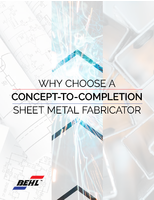Complex Metal Alloys withstand severe environments.
Share:
Press Release Summary:
Used to form Overlay Composite Structures (OCS), complex metal alloys can subsidize or replace protective metal welds and extrusions found in environments subject to extreme heat, corrosion, and wear. Multiple metal and non-metal powders with other elements are custom-engineered into high-performance alloys designed to overcome limitations of binary and ternary alloys. One such OCS material, used for protecting gasification equipment, is W/Cu/Ni/Co/Fe/Cr/Ti/Sn.
Original Press Release:
ArcMelt Debuts Material Breakthrough in Complex Metal Alloys
Power Generation, Refining, Mining, Paper and Biomedical Stand to Benefit
ST. LOUIS, Oct. 10 -- Breakthrough, high performance complex metal alloys that produce the next-generation of protection against severe industrial environments have been introduced by ArcMelt. The alloyed materials form Overlay Composite Structures (OCS) that will extend the lifecycle of power generation boilers, digesters, scrubbers and other equipment.
Oak Ridge National Laboratory and large international corporations are conducting material evaluations of the alloyed composites. Results show the composite structures withstand extreme heat, corrosion, wear and other conditions in environments where conventional overlay structures fail. They offer economic and performance advantages, compared to conventional film forming, non-joining weld overlays and sheet clad.
ArcMelt's material breakthrough is a technology that custom engineers multiple metal and non-metal powders with other elements into high performance alloys. The Overlay Composite Structures formed by the alloys can extend mean time between failures (MTBF) and shorten mean time to repair (MTTR).
"We can tailor make binary and ternary alloys, but we recommend multi- element alloys to overcome limitations inherent in binary and ternary compositions," said Chad Wagner, ArcMelt's Global Accounts Manager. ArcMelt's most recent OCS alloy contains eight elements.
One product the company is considering for protecting gasification equipment is W/Cu/Ni/Co/Fe/Cr/Ti/Sn (tungsten, copper, nickel, cobalt, iron, chromium, titanium and tin).
The large volume of tubing that forms water walls and super-heaters in coal-fired power plants stands to benefit significantly from the technology. OCS materials either can subsidize or replace the protective metal welds and extrusions currently found in these environments.
Overlay Composite Structures deposit on a given area up to ten times faster than conventional weld overlays. The application also uses considerably less material-one lb. per sq. ft., rather than the three to five lbs. required by welding. The total cost of this application is one-fifth that of welding. Boiler tubing with OCS lasts five to seven years, rather than the typical three years.
International licensing is available. Contact Chad Wagner, Global Accounts manager, at 850-450-6697, or at cawagner@arcmelt.com
About ArcMelt
ArcMelt, headquartered near St. Louis, Missouri, USA, produces multi-element alloys that are on the leading edge of the most important metallurgical revolution since the Bronze Age. The company's alloys can help economy-critical operations, such as power plants, refineries and coal mining, and aid in the advancements of biotech implants and fuel cells. Visit www.arcmelt.com.




